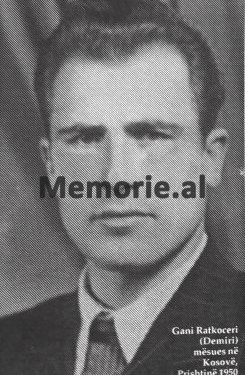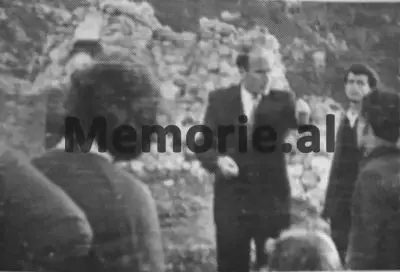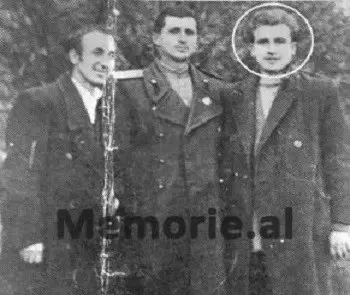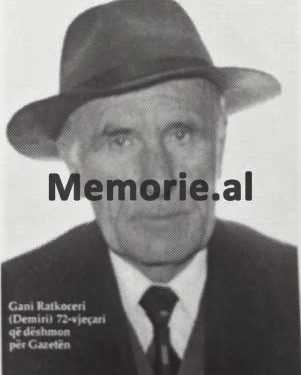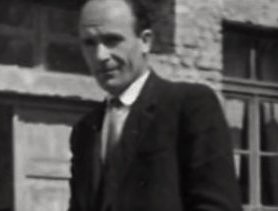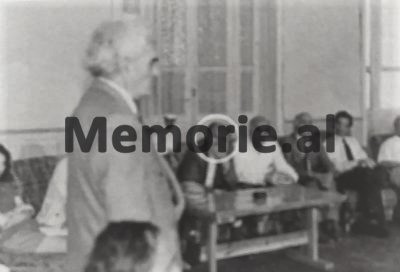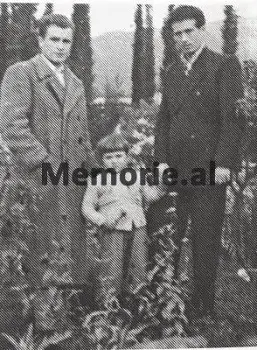By Gani Demiri Ratkoceri
Memorie.al / Gani Demir Ratkoceri were born in the village of Llugoxhi in the municipality of Lipjan in Kosovo, on 15.06.1930. He completed primary and secondary school in Kosovo. In 1951, after he was in danger of being arrested by the Titist regime of Yugoslavia at that time, he escaped and came illegally to Albania, where during the years 1953-1957, he completed his higher studies at the Faculty of Philology of the State University of Tirana, Language and Literature branch. After that he served as a teacher in several secondary schools in Tirana and in 1978, when he was a teacher in the district of Mirdita, he was arrested by the State Security and sentenced to 9 years in political prison accused of “agitation and propaganda against the popular power”. . In 1983, after the so-called “enemy group of Kadri Hazbi” was hit, Gani Demiri gained his innocence and was released from prison, being considered a “victim of Feçor Shehu”! After the 90s, in addition to many articles in the press of the time, he also published several books with studies, mainly of a historical nature, such as “Ahmet Gashi’s contribution to Albanian education”, etc. In 1995, he was decorated with the high title “Teacher of the People”. The text we are publishing below is taken from Gani Demir’s memoirs, where he describes the period he was arrested and was in Tirana prison.
STAY IN TIRANA PRISON
After I was sentenced to 9 years in prison, allegedly for “agitation and propaganda against the party and popular power”, the prison warden, Zeqir Lalaj, told me that the next day I would be taken to Tirana prison and that he himself would accompany me. We left with the “Jeep” of safety. Formally, Zeqiri tied my hands in front of me and told the driver to take us to the hospital. When we entered the hospital yard, he told the driver to go buy something to eat and then asked me where my house was. I showed him, and then asked him:
– What do you need my house for?
– “Let me inform the woman that you came to Tirana and not to come to Rrëshen because she has already come 26 times…”!
– Did you count them?
– “We counted almost all of them, because we felt sorry for her, but we had nothing to do with it. Now we are parting and I will see you soon in free life. I, within the possibilities I had, behaved well with you”.
– I thank you very much for behaving extremely well and I will never forget this and I will return the favor.
After thanking me, surprisingly, he hugged me tightly, as if I was free, and his eyes filled with tears.
The outer doors of the Tirana prison were thrown open and the “Jeep” quickly entered the prison yard, where many convicts were tortured and many of them died during the investigation. Zeqiri grabbed my arm and started to take me to the door of the prison, but a dark-haired, big policeman appeared in front of him and telling him that “I was in their hands”, he approached me and removed the bars and gave to Zeqir.
Then he put a pair of new irons on me, as if he were using them for the first time, although the distance to the prison door was no more than 4 meters. Zeqiri looked at me with pity and turned his back on me. He was holding those heavy irons, more than 30 years old. When we approached the door of the barn, the policeman took off my new bars and pushed me with force, almost knocking me over.
All the political prisoners of Albania sentenced by the court were gathered in the prison cell of Tirana. Here they kept them for several days and made the selection according to their ages. Those who were young up to 40 years old, were taken to Spaçi prison to extract ore, as in the Middle Ages, from the age of 40 to 50 years, in the construction of palaces and industrial facilities, while over 50 years old, they were divided according to punishments.
Those who were sentenced to 20-25 years in prison were taken to Burrel prison, which was like Dante’s “Hell”. The others are mainly in Ballsh prison, etc. The communist government of Enver Hoxha called only Burrell a prison, while the others were re-education camps.
In the prison of Tirana, the auto-prisoners worked day and night, bringing in new prisoners, taking old ones and sending them to other prisons.
But back to the barn. As soon as the door was closed, curious people started approaching me to find out who I was, where I was from, where I had worked and how long I had been sentenced. I was forced to answer. Fortunately, in the barn I found Nikola from Rrëshen’s cell, who had been brought two days before me.
Policeman Zeqiri did this on purpose to talk to me alone. Even Nikola was very happy when he saw me. I slowly got used to the collective life in the barracks, which was a preparation for the Ballsh prison and, later, for the Spaç prison.
In that prison hall, which was called kausha, there were all social categories: mountaineers, peasants, workers, small, medium, high officials, officers with different positions and even former generals…! There were not only members of the Politburo. Apparently, they kept them in another barn. Between them there were things in common, but also great differences.
Troubles, punishments and sufferings were common. The changes lay in the characters. Many of them had admitted crimes they had not committed, hoping that they would be punished less and the family would have less consequences. There were also those who had not admitted anything to the investigator, but very few. There were others who, under great pressure and torture, had agreed to become collaborators of the State Security.
The biggest change was that those who had been party members and held middle and high positions, although they had been tortured and sentenced to heavy imprisonment, still had faith in their party to treat them differently than those who did not they had been party members. Above all, they hoped that their party would release them soon, that’s why many of them had become collaborators of the Security Service and served their party even in prison.
I am mentioning two members of the Political Bureau, ministers Beqir Balluku and Kadri Hazbiu. When Enver exiled Beqir, he came out with the portrait of “comrade Enver” under his arm, hoping that one day he would rehabilitate him. While Kadriu, when Enver told him in the plenum that he would be arrested, he replied: “It’s okay that my party arrests me”, and Enver replied: “Yes, yes, your party will arrest you”!
Those who had not been members of the party, not only no longer had faith in the party, but hated it, even because they did not dare to express it, because they immediately sentenced them to another 10 years.
One morning, we were suddenly woken up by a loud noise and ten Security officers stormed in. Without dressing properly, they put us in line. That night, they had brought two prisoners from Spaçi prison. One was called Fadil Kokomani from Durrës and the other Vangjel Lezho. We lined up as ordered, and a major officer began to speak loudly:
-“Here, among you, there are sworn enemies (as if the others were friends) of the party of popular power. These are Fadil Kokomani and Vangjel Lezho” – and shouted at them loudly:
– “Get out of line”!
The two tied them not with the usual irons, but with chains and took them out of the cage by pushing and kicking them. After two days they were shot. The reason: that they had written a long letter to Enver Hoxha, with which they demanded that he leave as the leader of the party and leave the place to young people!/Memorie.al




